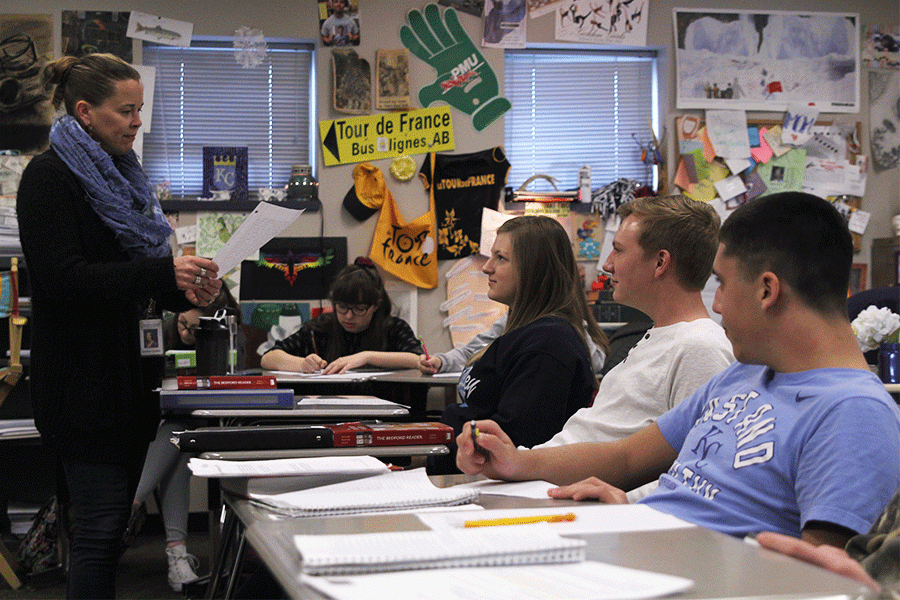Proposal to ban national curriculum reoccurs
Legislature reintroduces measure that would effectively end AP, IB and Common Core in Kansas
In AP Language and Composition, juniors Jazz Loffredo, Brady Rolig and Payton Frye (pictured right to left) wait patiently while communication arts teacher Kristen Crosbie checks their homework on Friday, Feb. 26.
March 10, 2016
Kansas legislators proposed a ban on statewide alignment with national standards for math and English for the fourth year in a row on Tuesday, Feb. 10. The bill, Substitute for House Bill 2292, hasn’t advanced any further at the time of writing.
The bill states that “the state shall retain sole control over the development, establishment and revision of K-12 curriculum standards.” This would mean the district would no longer align with the Common Core State Standards and would require all new materials.
This proposed readjustment seems premature to district secondary curriculum coordinator Ceresa Schaffer.
“I believe that this is an attempt at adjusting the standards now,” Schaffer said via email. “The regular standards review process is to take place in 2017, but apparently, some members of the board are not willing to be patient.”
This is the sixth state legislature bill since 2013 that has attempted to place a ban on the Common Core in Kansas.
House Committee on Education Chairman Ron Highland believes that Common Core is detrimental to the competitiveness of Kansas education.
“The Commissioner of Education, Dr. Randy Watson, has stated the State School Board’s mission is to make Kansas the leader in education in the world,” Highland said via email. “Their mission, which I support, would appear to contradict the basic premise of Common Core.”
With the bill receiving support and criticism from Republicans and Democrats alike, gifted services facilitator Carmen Shelly believes opposition to the Common Core may stem from misconceptions about its origin.
“[Lawmakers] do not see Common Core as having been written by the state of Kansas,” Shelly said. “The president and the education secretary and those types of people signed onto the Common Core, but it really was a consortium of states that wrote it and Kansas was a part of that, is my understanding.”
Kansas is one of 46 states to have adopted Common Core, which Schaffer believes helps students’ future preparation.
“As a district and as a state, we have embraced the Common Core initiative. The outcomes that are considered is what has driven us [to] take the standards and create curriculum that results in students who are college and career ready,” Schaffer said. “I believe that the approach points us in the direction of the outcome we all want for our children, happiness and success.”
The bill specifically mentions AP and International Baccalaureate, and could mean the end of those courses in Kansas. Shelly says the absence of advanced courses could negatively impact high-achieving students.
“The bill does ask for the AP and IB program curriculum to be aligned with Kansas standards, which would possibly not be able to happen because of the kind of structure that AP and IB give their classes,” Shelly said. “Our students would not have the opportunity to experience that kind of rigor in the classroom.”
As a student taking classes the bill may affect, senior Karla Kim sees the value in advanced courses.
“A lot of times I think those challenging courses give a better insight of what you’re more geared toward and what you’re talented in and it challenges you,” Kim said.
According to associate principal Leah Vomhof, the school will make accommodations for students looking for higher-level classes no matter what.
“I think that no matter what happens with this bill … at Mill Valley and in our district, we strongly believe in having advanced courses for students,” Vomhof said. “In whatever way we can do that, we will continue to do that.”
The state’s current Common Core-aligned standards, the Kansas College and Career Ready standards, took about four years to be fully integrated. Vomhof said she imagines implementing a new curriculum would take a similar amount of time. The district would determine what happens in the meantime.
“We would go with what the district and the state tell us to do for the interim,” Vomhof said. “So, if that means, following the path we’re on until they have fully written the new standards that’s what would we do.”
Highland hopes that the debate over the issue will help the state come to an agreeable resolution.
“Nobody has all the answers and solutions are found by discussion and good research,” Highland said. “I am hopeful that we all can find a solution to what has become a very controversial subject in our state.”











Karen Booth • Mar 22, 2016 at 12:39 pm
Dear Adri, If you are still interested in this subject, may I suggest you go to fortune.com, which is Fortune Magazine’s official site, and search c “common core.” They have a very detailed article about how too business executives pushed for a common educational program instead of 50 different state plans. This was spearheaded by people like Bill Gates(not the Koch brothers) in an attempt to raise education results in the US.
This is a very comprehensive article on this subject.
Thanks for your article. Karen Booth